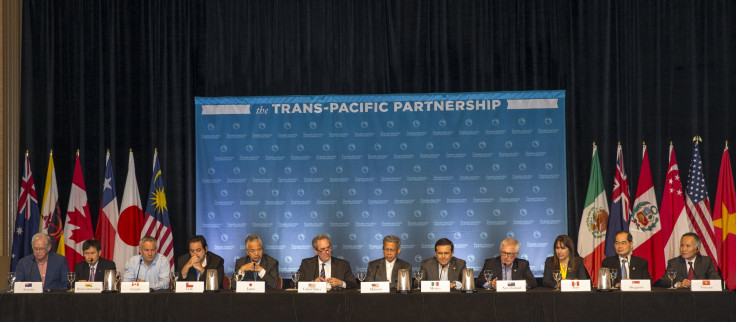New TPP Leaks Reveal US Pushing For Strong Copyright, IP Enforcement

A new set of secret documents from the controversial Trans-Pacific Partnership (TPP) free trade agreement were leaked Tuesday and Wednesday, showing a widening disagreement between member nations on the deal’s draconian copyright and intellectual property (IP) laws.
The documents, which are from the May 11 negotiations, were leaked by a Washington, D.C.-based nonprofit Knowledge Ecology International (KEI). The text showed that the TPP would significantly change global law related to patent and copyright issues, as well as provide only slim protection for whistleblowers.
The leaked documents reveal where negotiations stood between the representatives before the start of the newest round of talks, which ended in Hawaii earlier this week without a final deal. The 12-nation trade pact would put nearly 40 percent of global trade under a massive set of rules aimed at spurring growth and closer trade ties between the Asia Pacific region and Western Hemisphere countries.
One proposal put forth by Australia would allow countries to "cancel, revoke or nullify" a patent if "the patent is used in a manner determined to be anti-competitive, or abusive, in a judicial or administrative proceeding” -- a measure that was strongly opposed by the U.S. and Japan.
The proposed IP protection measure being pushed by the U.S., according to the leaked documents, would call for all nations to “ensure that its judicial authorities shall have the authority to order a party at whose request measures were taken and who has abused enforcement procedures to provide the party wrongfully enjoined or restrained adequate compensation for the injury suffered because of such [IP] abuse.”
According to the documents, the proposals also make significant changes to the copyright laws, calling for copyright to expand to 70 years beyond the author’s death. Several parties in the TPP negotiations, including Japan and Malaysia, currently have more lax copyright laws.
The text also empowers authorities to seize and destroy equipment that infringe copyright, as well as “materials and implements relevant to the infringement” such as computers or servers that host such materials. The leak reveals that the U.S. is opposing a measure that would limit these laws to goods “predominantly” used in infringement, instead calling for the seizure and destruction of equipment that committed only minor infractions of these laws.
KEI Director James Love said the new leaks revealed increasing disagreement between the countries involved in the deal. “The May 11, 2015, text includes country positions, and reveals extensive disagreements among parties, as well as the isolation of the United States as the country that continues to be the most aggressive supporter of expanded intellectual property rights for drug companies, publishers and other companies,” he said in a statement. “The proposals contained in the TPP will harm consumers and in some cases block innovation.”
Despite the growing dissent between negotiating nations, officials remain confident about the trade deal. U.S. Trade Representative Michael Froman said earlier in August: “We are more confident than ever that TPP is within reach. ... We have agreed we are going to continue to engage intensively ... in this coming period with the goal of resolving outstanding issues."
© Copyright IBTimes 2024. All rights reserved.











